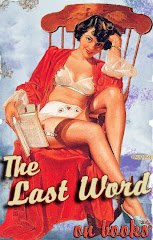Three words can describe this book: Over too soon! I admit, it was a few pages before I got used to the style of this particular work, which was done in letters and telegrams. At first, it does somewhat confuse me and removes me from the flow of the story, but as I got used to it, I became more and more involved in this novel and couldn't put it down. It was like these characters were very real people and I wanted to know them personally, become friends with them and invite them over for tea.
I am so enormously impressed with this book that I immediately went to the internet to search for contact info for the author so that I might beg for a sequel. I must know *********** successfully! How the book about ***************** finally turned out! I want to know if *************have more children! And I absolutely must know about Isola's motorcycle race!

Then I saw the memorial page for Mary Ann Shaffer and my heart dropped. What a horrible loss. I began tearing up, knowing her loss was possibly the loss of all these wonderful and eccentric people. I hope Annie Barrows (Shaffer's niece) might be persuaded to pick up the torch and keep it burning?
This novel had me laughing as well as crying. Such a delicate weaving of joy and tragedy. It truly can't end here, there is so much more these characters can offer! Once you immerse yourself in the style of the writing you can connect with each character in such a way that isn't always readily available in other fiction. In a way, the fact that it was fiction fell away. This novel shares tragedy and horror alongside incredible hope. It is not difficult to imagine Guernsey or to see the homes and landscape in your mind's eye.
The story begins at the end of WWII in London where a single woman named Juliet Ashton is trying to figure out what to write about next. During the war years, she wrote a humorous column under the pen name "Izzy Bickerstaff", trying to keep the spirits of the war-torn area, up. She writes her publisher, Sidney, that she's tired of the same ol' subject and wants to branch out. He encourages her to follow whatever she must to write her story. Mixed in with these missives, she writes her best friend in Scotland, a fellow author in Australia, and finally the inhabitants of Guernsey themselves.
The spark of interest in Guernsey starts when a resident of the island by the name of Dawsey Adams sends Juliet a letter regarding the author Charles Lamb. You see, Dawsey had possession of a book that had Juliet's name written in it as it had belonged to her previously, and he wanted to know if there were any other books about or by Charles Lamb he should read. He also asks her, if she would be so kind, to find the books and forward them on since the libraries and such in Guernsey were sadly lacking.
There begins an informative and amusing account of living in Guernsey, especially during the German occupation through the course of the war.
There are eccentric characters, nosy folks, shy men, and bold women living in Guernsey and one of the heroines is Elizabeth. Bit by bit her outline is painted in with vibrant colors from each correspondent.
The letters and telegrams are full of charm and wit as well suspense, causing me to firmly become embroiled with the lives and residents of Guernsey; most especially the members of the literary club.
I was torn about giving this novel a rating of 4 quills or 5 due to the disjointed and slow beginning. Truth be told, I almost put this novel down because of it. But it absolutely picked up and I am so glad I didn't give up. In the end, my desire for MORE of these characters has bumped my rating to a solid 5 quills.
Thursday, February 11, 2010
The Guernsey Literary and Potato Peel Pie Society
Subscribe to:
Post Comments (Atom)


2 comments:
Sounds really cool Kristine, think it's a good read for men too?
That's a good question Pary. Hmm. I think it depends on the book a man likes. There are definitely no scenes of blowing things up, but nor is there any heavy romance. There is a background of war, and the book has main characters who are men, and yet. I think perhaps this book would be about 50/50. I have a feeling not a lot of men have read this particular book, but I don't think it would hurt at all if they did.
Post a Comment